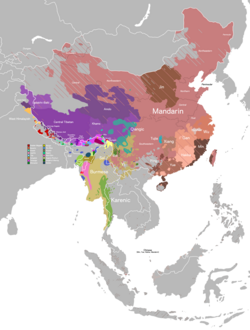Gallong language
| Galo | |
|---|---|
| Native to | Arunachal Pradesh, India |
Native speakers | 29,000 (2011 census)[1] |
Sino-Tibetan
| |
| Dialects |
|
| Language codes | |
| ISO 639-3 | adl |
| Glottolog | galo1242 |
| ELP | Galo |
The Galo language is a
Galo people
. Its precise position within Tani is not yet certain, primarily because of its central location in the Tani area and the strong effects of intra-Tani contacts on the development of Tani languages. It is an endangered language according to the general definitions, but prospects for its survival are better than many similarly-placed languages in the world.
Dialects
The major Galo dialects are Pugo, spoken around the district capital
.Post (2007:46) lists a provisional classification of Galo dialects.
- Galòo
- Karkòo?
- Gensìi?
- Taíi(podia)
- (branch)
- Zɨrdóo
- (branch)
- Larèe, Puugóo
Post (2013)[2] reclassified Karko as a variety of Bori.
Grammar
Like most central and eastern Tani languages, Galo is largely
lexical tones are present – High and Low – which may reflect two Proto-Tani syllable tones; in modern Galo, the surface TBU (Tone-Bearing Unit) is the usually polysyllabic phonological word. A robust finite/non-finite asymmetry underlies Galo grammar, and clause chaining and nominalization
are both rampant. No synchronic verb-serialization appears to exist, although what seems to have been proto-verb-serialization has developed into a very large and productive system of derivational suffixes to bound verbal roots.
Major (non-derived) lexical classes are noun, adjective and verb. Other grammatical features include
ergativity
has not been found.
Education
Galo language is taught as third language in schools of areas dominated by Galo community.[3]
See also
References
- ^ Galo at Ethnologue (25th ed., 2022)

- ^ Mark W. Post. 2013. 'The defoliation of the Tani Stammbaum: A positive-minded exercise in contact linguistics.' Paper presented at the 19th Himalayan Languages Symposium, Australian National University, Sep. 9-10.
- ^ "Arunachal to Preserve 'Dying' Local Dialects - North East Today". Archived from the original on 2018-08-25. Retrieved 2017-03-13.
Further reading
- Post, Mark W. (2007). A Grammar of Galo. PhD Dissertation. Melbourne, La Trobe University Research Centre for Linguistic Typology.

